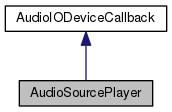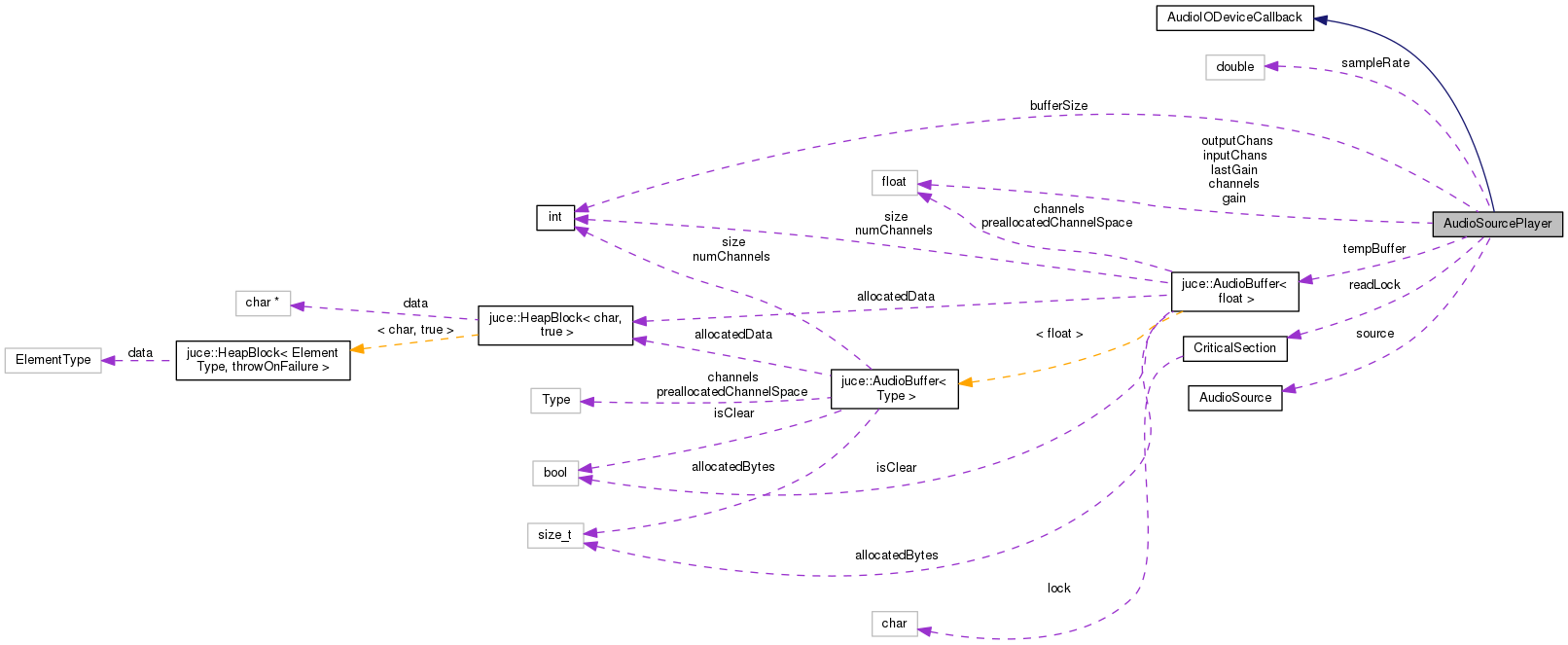Wrapper class to continuously stream audio from an audio source to an AudioIODevice.
More...
#include <juce_AudioSourcePlayer.h>
Wrapper class to continuously stream audio from an audio source to an AudioIODevice.
This object acts as an AudioIODeviceCallback, so can be attached to an output device, and will stream audio from an AudioSource.
◆ AudioSourcePlayer()
| AudioSourcePlayer::AudioSourcePlayer |
( |
| ) |
|
◆ ~AudioSourcePlayer()
| virtual AudioSourcePlayer::~AudioSourcePlayer |
( |
| ) |
|
|
virtual |
Destructor.
Make sure this object isn't still being used by an AudioIODevice before deleting it!
◆ audioDeviceAboutToStart()
| void AudioSourcePlayer::audioDeviceAboutToStart |
( |
AudioIODevice * |
device | ) |
|
|
overridevirtual |
◆ audioDeviceError()
| virtual void AudioIODeviceCallback::audioDeviceError |
( |
const String & |
errorMessage | ) |
|
|
virtualinherited |
This can be overridden to be told if the device generates an error while operating.
Be aware that this could be called by any thread! And not all devices perform this callback.
Reimplemented in SoundPlayer.
◆ audioDeviceIOCallback()
| void AudioSourcePlayer::audioDeviceIOCallback |
( |
const float ** |
inputChannelData, |
|
|
int |
totalNumInputChannels, |
|
|
float ** |
outputChannelData, |
|
|
int |
totalNumOutputChannels, |
|
|
int |
numSamples |
|
) |
| |
|
overridevirtual |
◆ audioDeviceStopped()
| void AudioSourcePlayer::audioDeviceStopped |
( |
| ) |
|
|
overridevirtual |
◆ getCurrentSource()
| AudioSource* AudioSourcePlayer::getCurrentSource |
( |
| ) |
const |
|
inlinenoexcept |
Returns the source that's playing.
May return nullptr if there's no source.
◆ getGain()
| float AudioSourcePlayer::getGain |
( |
| ) |
const |
|
inlinenoexcept |
◆ prepareToPlay()
| void AudioSourcePlayer::prepareToPlay |
( |
double |
sampleRate, |
|
|
int |
blockSize |
|
) |
| |
An alternative method for initialising the source without an AudioIODevice.
◆ setGain()
| void AudioSourcePlayer::setGain |
( |
float |
newGain | ) |
|
|
noexcept |
Sets a gain to apply to the audio data.
- See also
- getGain
◆ setSource()
| void AudioSourcePlayer::setSource |
( |
AudioSource * |
newSource | ) |
|
Changes the current audio source to play from.
If the source passed in is already being used, this method will do nothing. If the source is not null, its prepareToPlay() method will be called before it starts being used for playback.
If there's another source currently playing, its releaseResources() method will be called after it has been swapped for the new one.
- Parameters
-
| newSource | the new source to use - this will NOT be deleted by this object when no longer needed, so it's the caller's responsibility to manage it. |
◆ bufferSize
| int AudioSourcePlayer::bufferSize |
|
private |
◆ channels
| float* AudioSourcePlayer::channels[128] |
|
private |
◆ gain
| float AudioSourcePlayer::gain |
|
private |
◆ inputChans
| const float* AudioSourcePlayer::inputChans[128] |
|
private |
◆ lastGain
| float AudioSourcePlayer::lastGain |
|
private |
◆ outputChans
| float* AudioSourcePlayer::outputChans[128] |
|
private |
◆ readLock
◆ sampleRate
| double AudioSourcePlayer::sampleRate |
|
private |
◆ source
◆ tempBuffer
The documentation for this class was generated from the following file:

